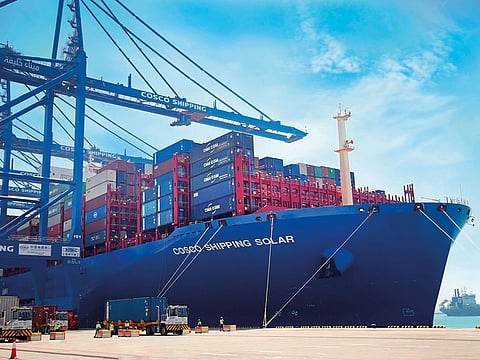Abu Dhabi’s position as a trade hub receives boost
Two of the world’s largest vessels arrive at CSP Abu Dhabi Terminal

Abu Dhabi: Abu Dhabi’s position as a major trade hub along China’s Belt and Road Initiative (BRI) received a boost after two of the world’s largest mega vessels arrived at CSP Abu Dhabi Terminal operated by China’s Cosco Shipping Ports Limited (CSP).
Abu Dhabi is trying to position itself as a major trade hub in the region and has invested billions of dirhams in boosting infrastructure, especially at Khalifa Port.
Cosco shipping built a terminal known as CSP Abu Dhabi Terminal at a cost of Dh1.1 billion. The terminal opened last December.
“The arrival of both the MV Cosco Shipping Solar and Pisces is a milestone moment for Abu Dhabi Ports and its partner, CSP. Not only does it demonstrate our growth as a hub port in the region, but also our position as the heart of Cosco’s network in the Middle East,” said Captain Mohammad Juma Al Shamisi, CEO of Abu Dhabi Ports.
The ships — MV Cosco Shipping Solar and Pisces — are the third and fourth main-line vessels to pass through CSP Abu Dhabi Terminal. With a capacity of 21,000 TEU (twenty foot equivalent units), Solar, which arrived on May 25, is the largest ship ever to call at Khalifa Port. The Pisces has a capacity of 20,000 TEUs.
“The container industry is constantly looking for ways to improve efficiency, and the use of mega-vessels to cut costs and time is a trend shaping the future of the sector. We have ensured that through CSP Abu Dhabi Terminal, Khalifa Port is able to handle the largest vessels of today and adapt to those of tomorrow.”
CSP Abu Dhabi Terminal is the result of a 35-year agreement between Abu Dhabi Ports and Cosco Ports, and forms part of a five-year strategy by Abu Dhabi Ports aimed at strengthening the maritime sector in the Emirate and driving economic diversification.
The strategy, in line with Abu Dhabi Economic Vision 2030, aims to increase regional trade and attract foreign direct investment. Abu Dhabi Ports has earmarked Dh10 billion in investment to increase capacity at Khalifa Port from the current 5 million TEU to 9.1 million TEU.



